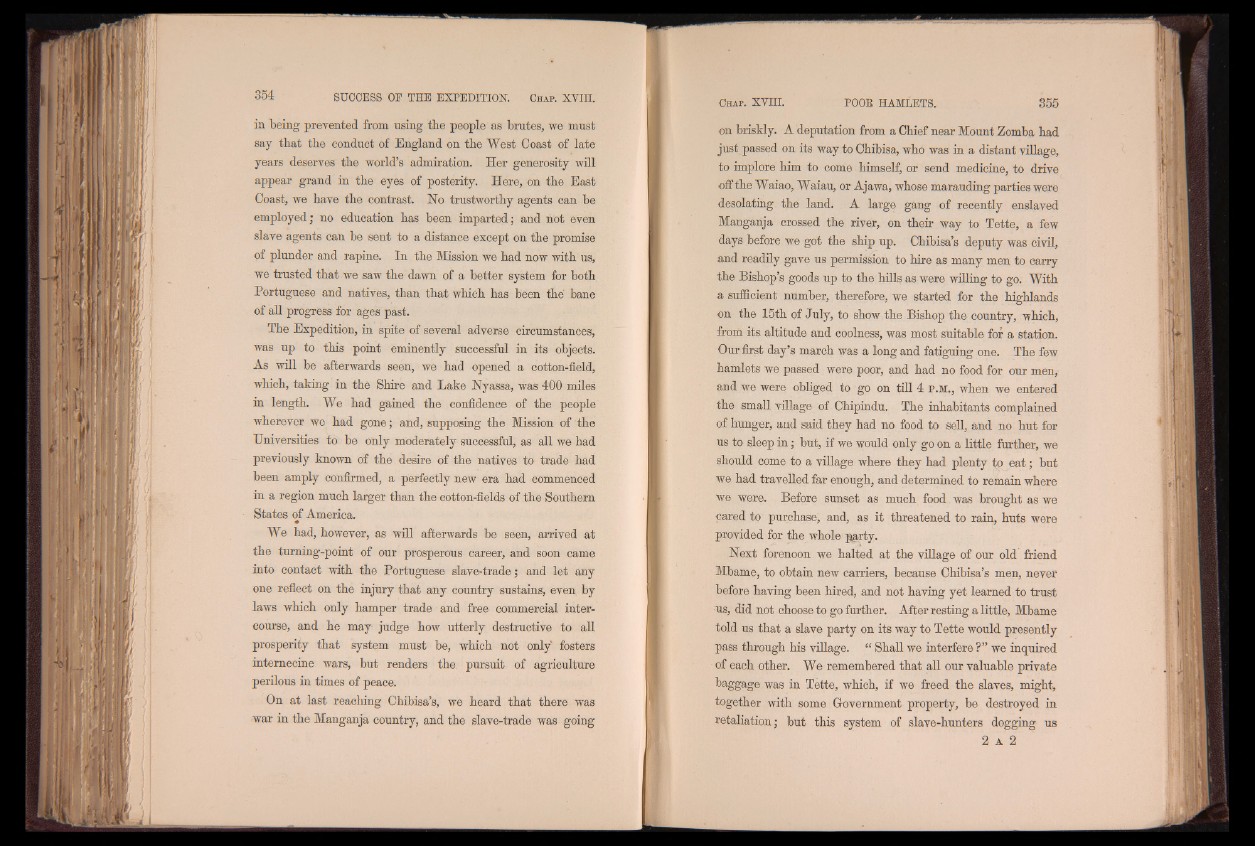
in being prevented from using the people as brutes, we must
say that the conduct of England on the West Coast of late
years deserves the world’s admiration. Her generosity will
appear grand in the eyes of posterity. Here, on the East
Coast, we have the contrast. No trustworthy agents can be
employed; no education has been imparted; and not even
slave agents can be sent to a distance except on the promise
of plunder and rapine. In the Mission we had now with us,
we trusted that we saw the dawn of a better system for both
Portuguese and natives, than that which has been the bane
of all progress for ages past.
The Expedition, in spite of several adverse circumstances,
was up to this point eminently successful in its objects.
As will be afterwards seen, we had opened a cotton-field,
which, taking in the Shire and Lake Nyassa, was 400 miles
in length. We had gained the confidence of the people
wherever we had gone; and, supposing the Mission of the
Universities to be only moderately successful, as all we had
previously known of the desire of the natives to trade had
been amply confirmed, a perfectly new era had commenced
in a region much larger than the cotton-fields of the Southern
States o♦f America.
We had, however, as will afterwards be seen, arrived at
the turning-point of our prosperous career, and soon came
into contact with the Portuguese slave-trade; and let any
one reflect on the injury that any country sustains, even by
laws which only hamper trade and free commercial intercourse,
and he may judge how utterly destructive to all
prosperity that system must be, which not only fosters
internecine wars, but renders the pursuit of agriculture
perilous in times of peace.
On at last reaching Chibisa’s, we heard that there was
war in the Manganja country, and the slave-trade was going
on briskly. A deputation from a Chief near Mount Zomba had
just passed on its way to Chibisa, who was in a distant village,
to implore him to come himself, or send medicine, to drive
off the Waiao, Waiau, or Ajawa, whose marauding parties were
desolating the land. A large gang of recently enslaved
Manganja crossed the river, on their way to Tette, a few
days before we got the ship up. Chibisa’s deputy was civil,
and readily gave us permission to hire as many men to carry
the Bishop’s goods up to the hills as were willing to go. With
a sufficient number, therefore, we started for the highlands
on the 15th of July, to show the Bishop the country, which,
from its altitude and coolness, was most suitable for a station.
Our first day’s march was a long and fatiguing one. The few
hamlets we passed were poor, and had no food for our men,
and we were obliged to go on till 4 p .m ., when we entered
the small village of Chipindu. The inhabitants complained
of hunger, and said they had no food to sell, and no hut for
us to sleep in ; but, if we would only go on a little further, we
should come to a village where they had plenty to e a t; but
we had travelled far enough, and determined to remain where
we were. Before sunset as much food was brought as we
cared to purchase, and, as it threatened to rain, huts were
provided for the whole party.
Next forenoon we halted at the village of our old friend
Mbame, to obtain new carriers, because Chibisa’s men, never
before having been hired, and not having yet learned to trust
us, did not choose to go further. After resting a little, Mbame
told us that a slave party on its way to Tette would presently
pass through his village. “ Shall we interfere ?” we inquired
of each other. We remembered that all our valuable private
baggage was in Tette, which, if we freed the slaves, might,
together with some Government property, be destroyed in
retaliation; but this system of slave-hunters dogging us
2 A 2